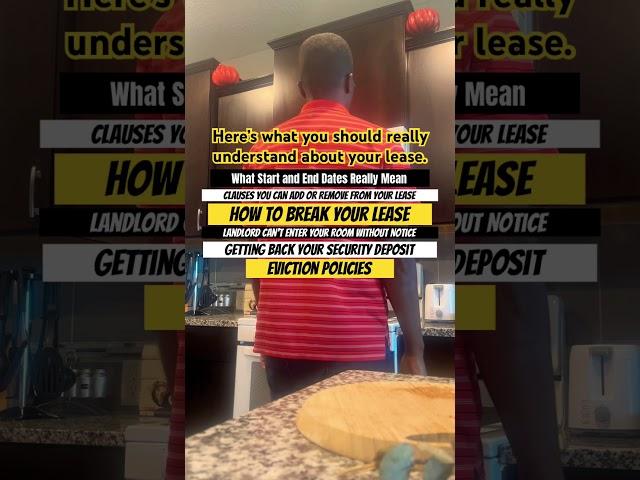
What to know about your renter’s rights #rentersrights #tenantrights
Are you aware of your renter’s rights?
Your landlord doesn’t want you to know this, but here’s what you should really understand about your lease.
1. What Start and End Dates Really Mean
- Your lease starts on a specific date, but it doesn’t mean you can move in immediately.
- The end date is just the deadline, but you may be responsible for early termination fees if you leave early.
- Understand if there’s a grace period for move-in/move-out.
- Clarify pro-rated rent if you’re moving mid-month.
- Always confirm these details in writing with your landlord.
Make sure you're clear on all dates to avoid confusion and extra costs.
2. Clauses You Can Add or Remove From Your Lease
- You can negotiate to remove automatic renewal clauses.
- Consider adding clauses that allow subletting if your situation changes.
- Negotiate pet policies and fees, even if they’re standard.
- Ask for repair and maintenance response time clauses.
- Protect yourself by customizing the lease to meet your needs.
Don’t sign a lease without understanding and negotiating key clauses.
3. How to Break Your Lease
- Check if there’s an early termination clause that outlines penalties.
- You can sometimes break a lease with sufficient notice or by paying a fee.
- Some states allow breaking a lease for job relocation or unsafe living conditions.
- Look into lease transfer or subletting options.
- Always get your landlord’s agreement in writing.
Breaking a lease doesn’t have to be a financial disaster if you’re informed.
4. The Landlord Can’t Enter Your Room Without Notice
- Most states require at least 24-48 hours’ notice for entry.
- Your landlord can only enter for repairs, inspections, or emergencies.
- You can request scheduled visits to limit disruption.
- Keep records of any unauthorized entries.
- Know your state laws for tenant privacy.
Don’t let your landlord overstep their legal boundaries—know your rights.
5. Getting Back Your Security Deposit
- Document the condition of the unit before and after your lease term.
- Know your state laws regarding security deposit return timelines.
- You can request a pre-move-out inspection to address any concerns.
- Send written requests for your deposit and keep records.
- Challenge any deductions that aren’t justified.
Protect your deposit by staying proactive throughout the rental process.
6. Eviction Policies
- Your landlord must give you written notice before starting eviction proceedings.
- Eviction laws vary by state—some offer extended grace periods.
- You have the right to contest an eviction in court.
- Consider negotiating with your landlord before it reaches legal action.
- Evictions should follow a clear legal process.
Know your rights if faced with eviction—don’t assume you’re powerless.
Follow me for more insights on renting and navigating the rental process with confidence.
Your landlord doesn’t want you to know this, but here’s what you should really understand about your lease.
1. What Start and End Dates Really Mean
- Your lease starts on a specific date, but it doesn’t mean you can move in immediately.
- The end date is just the deadline, but you may be responsible for early termination fees if you leave early.
- Understand if there’s a grace period for move-in/move-out.
- Clarify pro-rated rent if you’re moving mid-month.
- Always confirm these details in writing with your landlord.
Make sure you're clear on all dates to avoid confusion and extra costs.
2. Clauses You Can Add or Remove From Your Lease
- You can negotiate to remove automatic renewal clauses.
- Consider adding clauses that allow subletting if your situation changes.
- Negotiate pet policies and fees, even if they’re standard.
- Ask for repair and maintenance response time clauses.
- Protect yourself by customizing the lease to meet your needs.
Don’t sign a lease without understanding and negotiating key clauses.
3. How to Break Your Lease
- Check if there’s an early termination clause that outlines penalties.
- You can sometimes break a lease with sufficient notice or by paying a fee.
- Some states allow breaking a lease for job relocation or unsafe living conditions.
- Look into lease transfer or subletting options.
- Always get your landlord’s agreement in writing.
Breaking a lease doesn’t have to be a financial disaster if you’re informed.
4. The Landlord Can’t Enter Your Room Without Notice
- Most states require at least 24-48 hours’ notice for entry.
- Your landlord can only enter for repairs, inspections, or emergencies.
- You can request scheduled visits to limit disruption.
- Keep records of any unauthorized entries.
- Know your state laws for tenant privacy.
Don’t let your landlord overstep their legal boundaries—know your rights.
5. Getting Back Your Security Deposit
- Document the condition of the unit before and after your lease term.
- Know your state laws regarding security deposit return timelines.
- You can request a pre-move-out inspection to address any concerns.
- Send written requests for your deposit and keep records.
- Challenge any deductions that aren’t justified.
Protect your deposit by staying proactive throughout the rental process.
6. Eviction Policies
- Your landlord must give you written notice before starting eviction proceedings.
- Eviction laws vary by state—some offer extended grace periods.
- You have the right to contest an eviction in court.
- Consider negotiating with your landlord before it reaches legal action.
- Evictions should follow a clear legal process.
Know your rights if faced with eviction—don’t assume you’re powerless.
Follow me for more insights on renting and navigating the rental process with confidence.
Комментарии:
What to know about your renter’s rights #rentersrights #tenantrights
VA Loan Help Houston
Rune Tonsgaard Sørensen - Æ Rømeser [Danish String Quartet]
FOLK - et ljydarkiv
DRAGON BALL TIKTOK COMPILATION #10
IKCHIE2.0
Double Dragon IV (PC) Playthrough
Draconis422
Qazi Farid pothwari singer & Saeed Khan France Tour 2023
Saeed Khan music
Синдром Тревожного Ожидания Сексуальной Неудачи (СТОСН). КАК ИЗБАВИТЬСЯ?
Александр Лубенников

![Rune Tonsgaard Sørensen - Æ Rømeser [Danish String Quartet] Rune Tonsgaard Sørensen - Æ Rømeser [Danish String Quartet]](https://invideo.cc/img/upload/UW1oeGcwaVBqQWU.jpg)
























